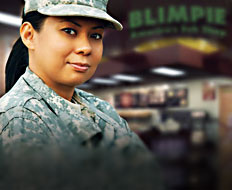On August 5, President Obama proposed several tactics that would help military veterans returning to civilian life find jobs. The president also called on Congress to re-introduce the Help Veterans Own Franchises (HVOF) Act, which was originally introduced in 2009.
The new proposals, and passage of the HVOF Act, could result in an influx of military veterans becoming quick-serve franchisees.
President Obama’s proposals include tax breaks for businesses that hire veterans and a new Department of Defense task force to help service-sector members find private-sector jobs. They also include new career-development programs in the Labor Department and Office of Personnel Management to train military veterans for private-sector employment.
Introduced in the 111th Congress by Sen. Bob Casey (D-Pa.) and Reps. Aaron Schock (R-Ill.) and Leonard Boswell (D-Iowa), the HVOF Act establishes a tax credit for franchises that offer veterans discounted initial franchise fees, training, and additional support.
The tax credit would amount to as much as 50 percent of the total franchise fee discounted by the franchisor, with a cap of $25,000 per unit. The HVOF Act also provides a tax credit to veterans who become franchisees, equal to 25 percent of the remaining franchise fee.
While the HVOF Act has bipartisan support—it has 45 cosponsors in Congress, both Democrats and Republicans, according to opencongress.org—it stalled after its original introduction when Congress got mired in the partisan battle over health care reform.
But with national unemployment at 9.1 percent, a jobs initiative for veterans may now have a better shot at making its way through Congress.
“At a time when everyone is focused on job creation in Washington, we think that the timing is good for us to be talking about this issue,” says Matthew Haller, director of communications for the International Franchise Association (IFA).
Still, Haller is tempering his expectations for the Act’s chance of passage in a Congress festering with partisan divisiveness over national debt and other issues.
“I think the prospects are good … but, at the same time, we have to be realistic about the political realities in Washington right now,” Haller says.
With the fate of the HVOF Act up in the air, the IFA is jumpstarting its own campaign to recruit military veterans into the franchise business. Initiated after the Persian Gulf War, VetFran helps returning service members access franchise opportunities through training, financial assistance, and industry support.
“Since the program's inception, nearly 2,100 veterans have become franchise owners and thousands more are successful in franchising as executives, managers, and staff,” the IFA said in a press release following President Obama’s August 5 announcement.
The 400 franchisor member companies participating in VetFran, which is officially endorsed—but not funded—by the U.S. Department of Veterans Affairs’ Center for Veterans Enterprise, include Little Caesars, Dairy Queen, and Einstein Bros., among many other quick-serve chains.
In promoting VetFran, the IFA says military veterans make for ideal franchisees because running a franchise business demands operational execution and commitment—something ex-service members had instilled in them during their time in the military.
Chris Morocco is CEO of Petrus Brands, which owns Planet Smoothie and Shane’s Rib Shack. He says that with its top three locations near military bases, Shane’s already appeals to military personnel. Giving military veterans an incentive to become franchisees was a logical next step, he says.
“If we appeal to that consumer base, what better owner-operator can we have than a military veteran?” Morocco says.
On that premise, Shane’s is offering its own veteran incentive program: a $20,000 franchise fee discount (from $30,000 down to $10,000) and $10,000 of grand-opening support to veterans who become franchisees.
“With the relationship we have with [the military] community, we wanted to leverage it further, and that’s why we’re offering this program,” Morocco says.
Echoing the IFA, Morocco also sees military veterans as well suited to running a restaurant franchise.
“We have a couple [of franchisees] who are military veterans, and they demonstrate an ability to follow a system and to put the brand above themselves, much like they did when they put their country above themselves,” Morocco says.
Blimpie is another quick-serve chain that invests in veteran franchisees. In January, the sub concept launched a program called Blueprint 47 that lowers its initial franchise fees from $18,000 to $47 for military veterans and existing franchisees. (Blimpie is celebrating its 47th anniversary.)
Keith Hammond, a Blimpie franchisee who is a veteran of the U.S. Army, is already taking advantage of the program by buying two new franchises.
“For a current store owner like myself, it’s a fantastic opportunity,” says Hammond, who already owns one Blimpie, in Hamilton, Georgia, about an hour north of Fort Benning. “I wish I could do more.”
Hammond estimates the $17,953 franchise fee discount as roughly 20 percent of what it would normally cost him to open a new store. While there is still a lofty barrier of entry for military veterans, Hammond says the discount is “enough to get them interested.”
He also says programs like Blueprint 47 help chains market themselves as “American” brands.
“Transitioning back into civilian life can be terribly difficult … so I can’t think of a better group of young men and women that we need to target,” Hammond says.







